Feng Ni
PP-DocBee: Improving Multimodal Document Understanding Through a Bag of Tricks
Mar 06, 2025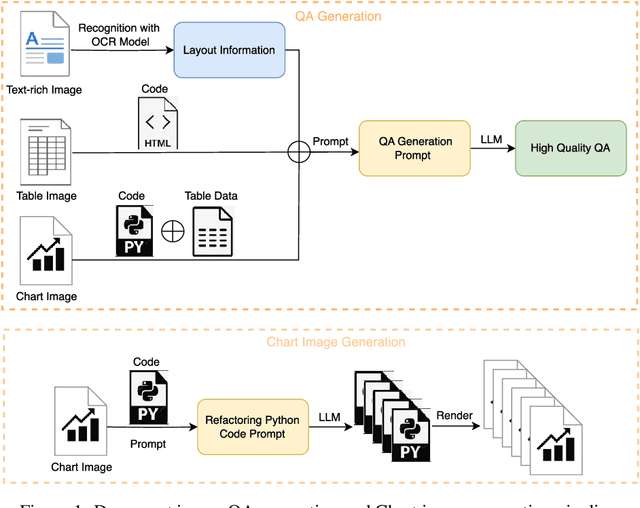
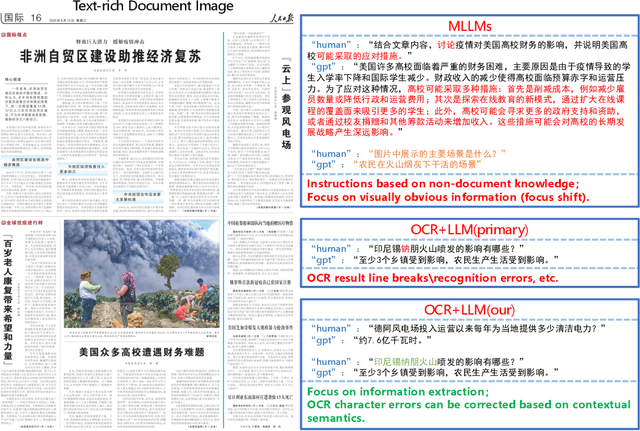
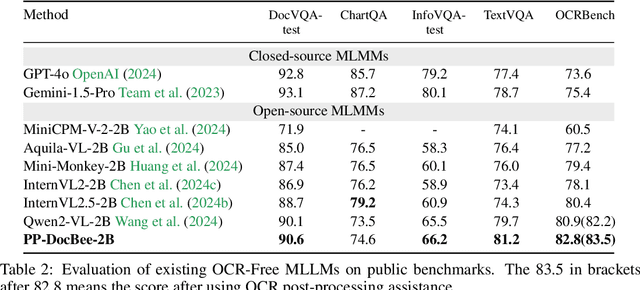
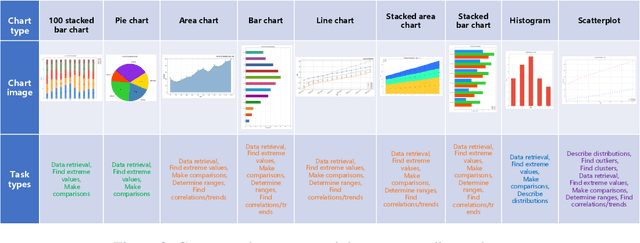
Abstract:With the rapid advancement of digitalization, various document images are being applied more extensively in production and daily life, and there is an increasingly urgent need for fast and accurate parsing of the content in document images. Therefore, this report presents PP-DocBee, a novel multimodal large language model designed for end-to-end document image understanding. First, we develop a data synthesis strategy tailored to document scenarios in which we build a diverse dataset to improve the model generalization. Then, we apply a few training techniques, including dynamic proportional sampling, data preprocessing, and OCR postprocessing strategies. Extensive evaluations demonstrate the superior performance of PP-DocBee, achieving state-of-the-art results on English document understanding benchmarks and even outperforming existing open source and commercial models in Chinese document understanding. The source code and pre-trained models are publicly available at \href{https://github.com/PaddlePaddle/PaddleMIX}{https://github.com/PaddlePaddle/PaddleMIX}.
PF-Net: Point Fractal Network for 3D Point Cloud Completion
Mar 01, 2020
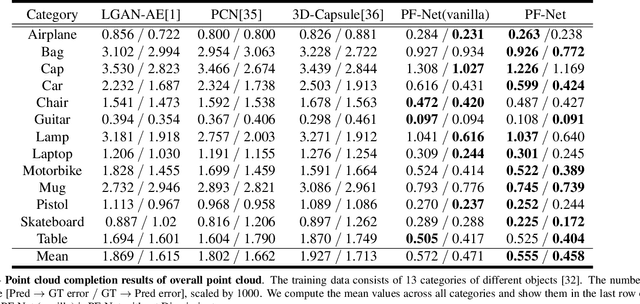


Abstract:In this paper, we propose a Point Fractal Network (PF-Net), a novel learning-based approach for precise and high-fidelity point cloud completion. Unlike existing point cloud completion networks, which generate the overall shape of the point cloud from the incomplete point cloud and always change existing points and encounter noise and geometrical loss, PF-Net preserves the spatial arrangements of the incomplete point cloud and can figure out the detailed geometrical structure of the missing region(s) in the prediction. To succeed at this task, PF-Net estimates the missing point cloud hierarchically by utilizing a feature-points-based multi-scale generating network. Further, we add up multi-stage completion loss and adversarial loss to generate more realistic missing region(s). The adversarial loss can better tackle multiple modes in the prediction. Our experiments demonstrate the effectiveness of our method for several challenging point cloud completion tasks.
CFENet: An Accurate and Efficient Single-Shot Object Detector for Autonomous Driving
Oct 10, 2018


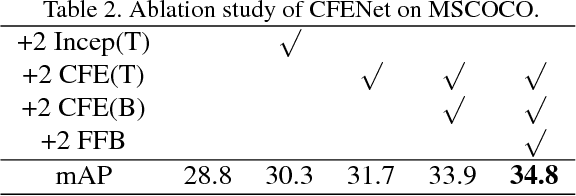
Abstract:The ability to detect small objects and the speed of the object detector are very important for the application of autonomous driving, and in this paper, we propose an effective yet efficient one-stage detector, which gained the second place in the Road Object Detection competition of CVPR2018 workshop - Workshop of Autonomous Driving(WAD). The proposed detector inherits the architecture of SSD and introduces a novel Comprehensive Feature Enhancement(CFE) module into it. Experimental results on this competition dataset as well as the MSCOCO dataset demonstrate that the proposed detector (named CFENet) performs much better than the original SSD and the state-of-the-art method RefineDet especially for small objects, while keeping high efficiency close to the original SSD. Specifically, the single scale version of the proposed detector can run at the speed of 21 fps, while the multi-scale version with larger input size achieves the mAP 29.69, ranking second on the leaderboard
Deep Dual Pyramid Network for Barcode Segmentation using Barcode-30k Database
Jul 31, 2018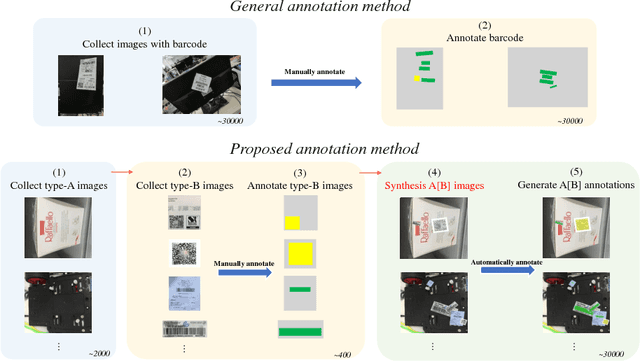



Abstract:Digital signs(such as barcode or QR code) are widely used in our daily life, and for many applications, we need to localize them on images. However, difficult cases such as targets with small scales, half-occlusion, shape deformation and large illumination changes cause challenges for conventional methods. In this paper, we address this problem by producing a large-scale dataset and adopting a deep learning based semantic segmentation approach. Specifically, a synthesizing method was proposed to generate well-annotated images containing barcode and QR code labels, which contributes to largely decrease the annotation time. Through the synthesis strategy, we introduce a dataset that contains 30000 images with Barcode and QR code - Barcode-30k. Moreover, we further propose a dual pyramid structure based segmentation network - BarcodeNet, which is mainly formed with two novel modules, Prior Pyramid Pooling Module(P3M) and Pyramid Refine Module(PRM). We validate the effectiveness of BarcodeNet on the proposed synthetic dataset, and it yields the result of mIoU accuracy 95.36\% on validation set. Additional segmentation results of real images have shown that accurate segmentation performance is achieved.
 Add to Chrome
Add to Chrome Add to Firefox
Add to Firefox Add to Edge
Add to Edge